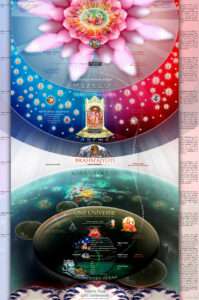Question
Hare Krishna devotees !! Accept my respectful obeisances! All glories to Srila Prabhupada !! Accept my most repeated obeisances, Manonatha Maharaja!!
I wanted to greet you and ask a small question … how to transcend this material world? I am very doubtful! Krishna speaks to us about the weapon of knowledge … but since doubt is something subtle and internal, how should I obtain inner knowledge without speculation? And how, once understood, realize it in my action!?
I found the verses of Chapter 4 of the Bhagavad Gita (Transcendental Knowledge), texts 40, 41 and 42 enlivening. Thank you so much. That the mercy of Sri Krishna bless us all! Haribol!
Answer
The verb “to transcend” comes from the adjective “transcendent” which means “crossing something to go higher” (from the latin words “trans” and “ascendere”).
Now, if we want to transcend we need an inferior reality and another one we prefer.
Vaisnava philosophy establishes these two realities as apara-prakriti and para-prakriti. The first is the material reality and the second is the spiritual reality.
Those who live in apara-prakriti want to transcend, namely to go to the second one, while we have never heard or read (nor would it be logical) of anyone from the spiritual world wanting to “transcend” Vaikuntha to go to the material world.
Therefore the definition of “inferior” of the apara-prakriti is correct.
In the history of the world we have had so many people, yogis and saints, wanting to transcend the world they were born in and go to the superior reality. Why?
Because they are made of that superior reality.
Have you ever heard of a fish wanting to be a bird or a bird wanting to be a fish? No, because the first is “made of water” and the second is “made of air”.
We want to leave the material world to go to the spiritual world because we are not made of matter but made of spirit.
na jayate mriyate va kadacin
nayam bhutva bhavita va na bhuyah
ajo nityah sasvato ‘yam purano
na hanyate hanyamane sarire
“For the soul there is neither birth nor death at any time. He has not come into being, does not come into being, and will not come into being. He is unborn, eternal, ever-existing and primeval. He is not slain when the body is slain.”
We are the soul and since its most evident quality is life, it is often called jiva, the living (from the sanskrit root jiv, to live).
Now that we have established the identity of the world we want to transcend, that one of the world we want to get to and of the person who wants to transcend, the answers to your questions become quite easy.
Just like an iron bar will “transcend” its cold nature by being put in a blazing fire, in the same way we can transcend this world by remaining in constant contact with a source of spiritual energy.
But just like if you put the iron bar in and out it will never become hot, in the same way if we constantly step in and out of Krishna consciousness we’ll never purify ourselves.
And what is this source of spiritual energy? We all know by now: chanting Hare Krishna, studying the scriptures, and so on and so forth.
Knowledge is acquired by study and practice of the theory (jnana) and by realized knowledge (vijnana).
By the word “speculation” we mean some human idea not corroborated by bonafide authorities, who are Guru (the spiritual master), Sastra (holy scriptures) and Sadhu (saints).
If we like imperfections, then we should continue to speculate. If we want perfection we should study perfect words. It’s our free choice.
Once one has perfect knowledge he will obviously act accordingly.
The word samsaya[1] needs some serious explanation for a correct understanding, without which one may misunderstand that a devotee should not have doubts. All questions come from doubts; it’s an integral part of our discipline. So samsaya means something else and we can talk about that some other time.
[1] Doubts
This is a section of the book “Brilliant as the Sun”.
To buy the complete book, click above
Post view 496 times




Leave a Reply